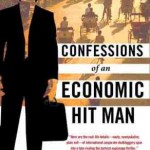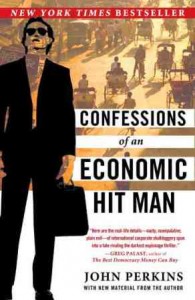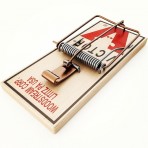Author: John Perkins
Copyright: 2004
Copy: Picked it up randomly at Borders.
Gist: John Perkins feels bad for the global economic sins of his past and decides to write Confessions of an Economic Hitman. Perkins attempts to explain how he and a few other unnamed individuals went about the world promoting U.S. economic interests to the detriment of foreign countries. Perkins ultimately is trying to repent for what he considers to be his past sins and in doing so is trying to explain to the world what is really going on.
My Thoughts: To be honest I can’t remember a ton of detail about this book since I read it so long ago. I read this back when I hadn’t developed my ridiculous method for note taking or idea capturing, so I had to reread portions of the book to refresh my memory. However, I do remember the excitement I had when I read this book. I remember feeling I had an insiders peek to what has really happened in the global economy and that everyone else must read this. There are some great ideas that seem to explain the reason the U.S. and other countries have engaged in certain economic and business practices which ultimately lead to debt and economic/political slavery.
On this post I’m going to comment on two key ideas I remembered during my refresher. The first will be the general premise of what an “Economic Hit Man” did to accomplish his goals page20. The second will be an exact example of what Perkins did in India ch22.
What Does an Economic Hit Man Actually Do?
Perkins was trained by some sneaky woman, never in the same location, who he could never find after their last meeting. She told him flat out,
“We’re paid – well paid – to cheat countries around the globe out of billions of dollars. A large part of your job is to encourage world leaders to become part of a vast network that promotes U.S. commercial interests. In the end, those leaders become ensnared in a web of debt that ensures their loyalty. We can draw on them whenever we desire – to satisfy our political, economic, or military needs. In turn, these leaders bolster their political positions by bringing industrial parks, power plants, and airports to their people. Meanwhile, the owners of U.S. engineering and construction companies become very wealthy.”
This portion reminded my so much of Sun Tzu’s The Art of War. Basically the most effective countries and strongest are those who can obliterate their enemies resources and cause them to bow down without having to use military force. So, the U.S. has taken a page form Sun Tzu and tried to cause multiple countries to fall economically, thus becoming a forced “ally” of the U.S. However, who is the U.S. in debt to the most currently? In May 2009 the U.S. owed China $772 billion. We’re the victims of this strategy more than I think we realize.
Perkins walks through a number of examples to demonstrate that the U.S. has used this technique to subjugate countries to our will. Economic Hit Men would basically go into a country, lie to them to think they’re going to have an economic boom or that that need to provide better infrastructure to their country, and then the U.S. comes in and does a ton of work that the country can’t pay for. As a result, the country is now in debt to the U.S. and we can demand different types of payment like military installations in country as well as policy that favors the U.S. Damn sneaky is all I’m gonna say.
India, an Example
Perkins went to India to get them to build a ton of dams that would require a lot of financial debt. A number of native Indians resisted the building of the dams and so those involved tried to back out of the deal with Perkins. It was Perkins’ job to ensure the indebtedness of those in India and smooth out the bump with the natives. So he did his job. He convinced the Indians that the “farmers” were actually communists because they had AK47. He connected the AK47s to Russians, then to communists, and then back to the farmers. Perkins didn’t believe it and knew he was a liar, but he felt he had a job to do.
In a conversation with a coworker Perkins told her, “Every day I come to hate my job a little more.” His coworker asks, “Your job?” Perkins takes a second to understand the question and then replies, “myself.” Even though he knew he was lying to these people and hated himself for it he still went out and caused countries to fail financially. An amazingly insightful book about the global economic war we’ve been fighting since at least the 1960s.
Comments: There’s a lot more that could be said about the U.S. economic endeavors internationally and the implications that has on international policy and a global economy. If you’re curious about why we’ve done certain deals internationally with Panama or Iran this is an interesting view on those relationships.








Leave a reply